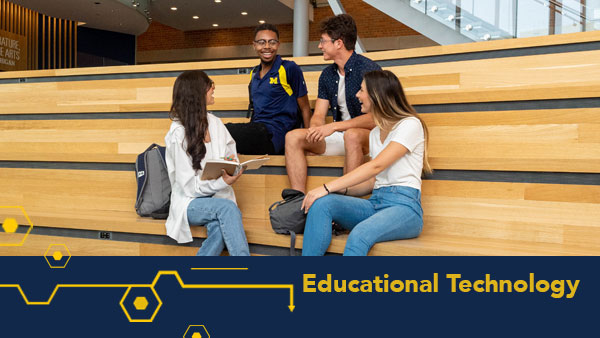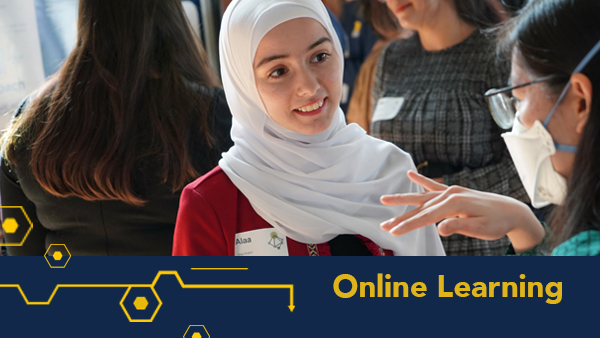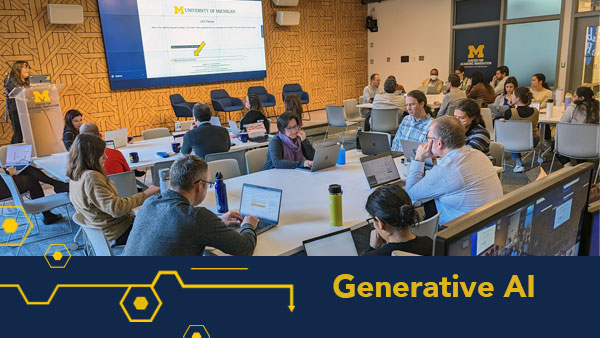Barry Fishman, Faculty Innovator-In-Residence, Arthur F. Thurnau Professor of Information and Education
@barryfishman
For our fourth and final AIM:TRUE session of the 2018-19 academic year, we were joined by Dr. Sean Gallagher, founder and Executive Director of Northeastern University’s Center for the Future of Higher Education and Talent Strategy and Executive Professor of Educational Policy at Northeastern. Sean is a national thought leader on the topic of alternative models for college credentials and degrees with more than two decades of experience in higher education.
AIM:TRUE stands for “Academic Innovation at Michigan: Transforming Residential Undergraduate Education.” The talk series is part of an effort to rethink the premises of undergraduate education that we call “The Big Idea” (to be expanded upon later). The Big Idea is a response to the following question: “Given the capabilities and resources of a major public research university like the University of Michigan, how would you design residential undergraduate education, if you could start with a blank slate?” It is an intriguing question, full of possibilities. A group of faculty, staff, and students from across the University of Michigan is pursuing those possibilities, with hopes of launching a new kind of undergraduate program.
The AIM:TRUE talk series is designed to inform and provoke our thinking around what is possible in education. Our first session featured the leaders of the Mastery Transcript Consortium, a group working to design a new transcript for college applicants that reflects students as unique individuals and not as a set of numbers and list of activities. Our second session was a talk by Dr. David Scobey, Director of the Bringing Theory to Practice Project at the Association of American Colleges and Universities. Dr. Scobey asked us to consider the multiple challenges facing higher education, especially in relation to the multiple publics it is supposed to serve. Our third session featured a range of projects in which the University Library is partnering with instructors across campus to support innovative forms of pedagogy aligned with Big Idea learning goals.
We invited Sean Gallagher to campus to talk with us about the changing landscape for higher education degrees and credentials, in a session entitled: “What does college prepare students for? Employer demand and online credentials.” In his presentation, Sean shared evidence of how the landscape for educational credentials is evolving, based on surveys and research from a range of sources, including his own center at Northeastern. Employer demand for educational credentials is growing, and the changing nature of work is driving an escalation in the level of educational qualifications required for jobs. A job that used to only prefer a high school degree now may require a bachelor’s. Jobs that often required a bachelor’s in the past now prefer a master’s. And beyond that, a majority of employers now believe that their employees will—at all educational levels—need continuous lifelong learning to stay current, and this translates into more credentials.
What does all this mean for higher education? Will university degrees be threatened by the rise of “micro-credentials” (digital badges) and blockchain? For the moment, this issue seems more hypothetical than existential for universities. Employers do not yet really understand or value micro-credentials (though awareness and experience continue to grow), and while it is becoming possible to be hired without a university degree, employers still seem to prefer degrees. In this environment, universities seem to be focusing on making their degrees available to more people, and a primary vehicle for this is online degrees, often delivered via MOOC platforms; one example is the new Master’s in Applied Data Science online program from the U-M School of Information. Gallagher has observed in a recent EdSurge column that, as interest in online degrees grows, “prestigious” institutions are leading the way. And as we move down this path, it is important to pay attention to other emerging trends, such as hiring practices that focus on specific job candidate skills that are usually obscured behind degrees. The rise of digital platforms to support online degrees can also support more granular evidence of student learning, performance, and accomplishment. As we build our online offerings, are we also positioning ourselves to support the new world of hiring?
To learn more, you can view Dr. Gallagher’s slide deck here or watch a recording of his talk below.
We also recommend Sean’s excellent book, “The Future of University Credentials: New Developments at the Intersection of Higher Education and Hiring.”
Finally, we are pleased to announce that the Big Idea project is getting a new name. From here forward, we will be referring to this effort as the TRUE program. Which stands for (as you know by now), Transforming Residential Undergraduate Education. Stay tuned for more talks in the AIM:TRUE series in the next academic year, and for more announcements and posts related to the TRUE program. Stay TRUE!


